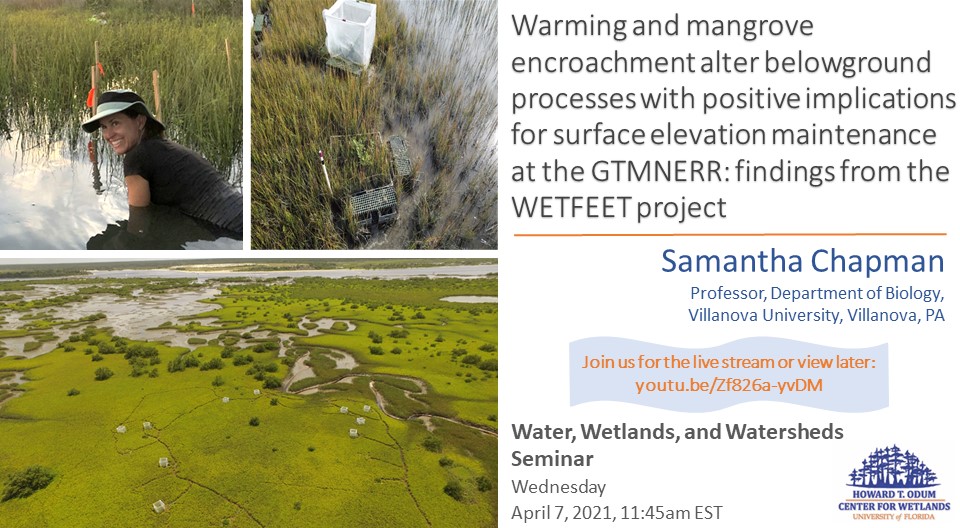April 7, 2021
Warming and mangrove encroachment alter belowground processes with positive implications for surface elevation maintenance at the GTMNERR: findings from the WETFEET project
Samantha Chapman, Professor, Department of Biology, Villanova University, Villanova, PA
Join us for the live stream April 7, 11:45am EST: youtu.be/Zf826a-yvDM
ABSTRACT
Samantha Chapman, Adam Langley, Gabby Canas, Emily Geoghegan, Candy Feller, Nikki Dix, Ches Vervake, Mark Hester, and Jim Morris
Though we are beginning to understand some consequences of mangrove encroachment into marshes, the implications of this shift, and of sustained climatic warming, for the resilience of wetland habitats in northeast Florida. At three sites in northeast Florida, USA, we deployed warming chambers on both marsh-dominated and mangrove dominated plots to investigate how warming influences plant above- and below-ground growth, organic matter decomposition and surface elevation with respect to sea level rise. We also modified the Marsh Elevation Model to assess how wetland surface elevation will respond to sea level rise in the presence of encroaching mangroves. Warming chambers have warmed the air temperature by an average of 2°C, which is similar to the climate change that is predicted for northeast Florida. Warming increases mangrove aboveground growth after two years, especially at the most northern site. Root growth was also stimulated by both mangrove presence and warming, with potential positive effects for surface elevation. Neither warming nor mangrove presence altered organic matter decomposition rates in soils. Mangrove-Marsh Elevation Model runs show that mangroves have a higher capacity for maintaining surface elevation with respect to sea level rise than salt marshes do. Further, young mangroves may do an especially good job at building elevation in the face of sea level rise. The WETFEET project findings described above are helping inform coastal wetland management in the face of climate change and sea level rise.
Bio
Dr. Samantha Chapman is a professor and scientist at Villanova University in Pennsylvania, USA. She is also currently the co-director of the Center for Biodiversity and Ecosystem Stewardship (CBEST) and runs the WETFEET project. Dr. Chapman received her Ph.D. from Northern Arizona University and did a postdoctoral fellowship at the Smithsonian Environmental Research Center. She is an ecosystem ecologist who is interested in how climate change and altered biodiversity change the services that l ecosystems provide. She has received grants from NASA, the U.S. National Science Foundation, NOAA, the U.S. Forest Service and the U.S. Department of Agriculture to conduct her research. Sam and her team collaborate to understand how climate change and rising sea levels alter coastal ecosystems. For more information on her research, see her WETFEET website and lab group website.
Seminar postcard

